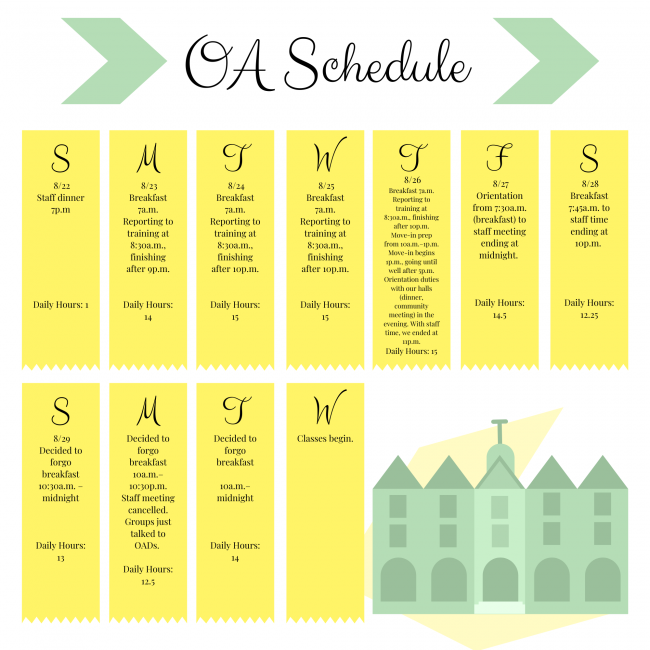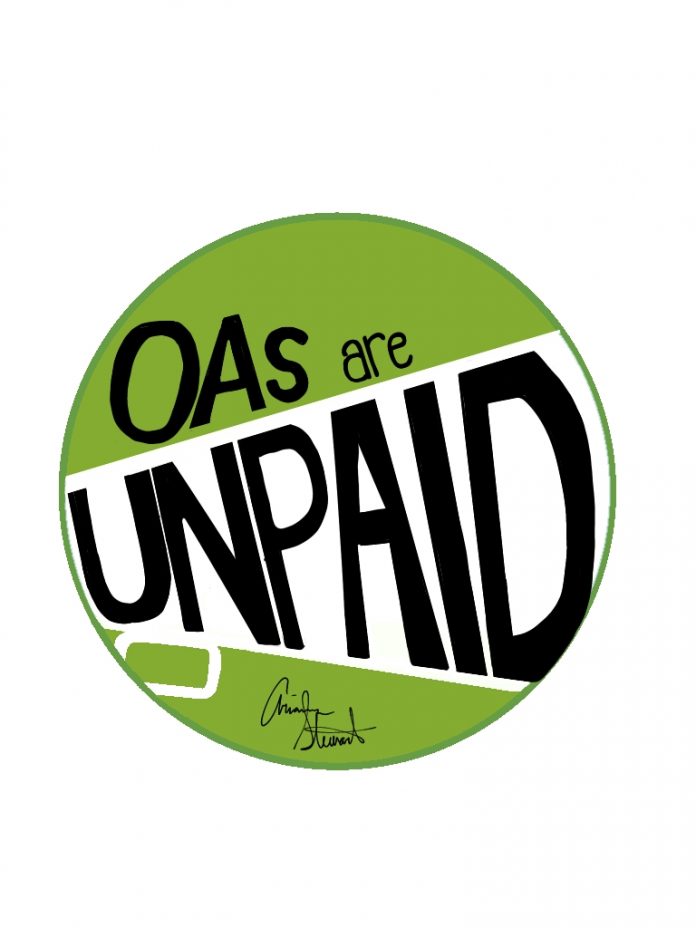Orientation Aides provide essential labor to the College of William and Mary. We introduce students to campus, often for the first time. We train them in campus policies and protocols (the Good Griffin medical amnesty policy, sexual violence resources on campus, how to get accommodations, etc). We are physically in the room with them when Banner crashes while they’re registering for classes, and we help them send emails to professors asking for overrides. We also help reassure families that their children are in good hands here, and for many that can be hard, especially coming out of a pandemic where they’ve spent the last year and a half living in close quarters with them.
Most new students are unaware of the extensive, violent history of our campus, and as OAs, I believe it’s our job to begin that introduction to our history. I find it critical for all members of our community to be aware of what has happened in this space that we are occupying so we can continue to occupy it, and often that first introduction happens during Orientation when we give our campus tours, talk about the Lemon Project’s work and discuss the student energy toward activism and organizing here.
As OAs, we are vital in guaranteeing the smooth transition into the new year for the College. But we don’t get paid at all. (Unless you count two neon yellow t-shirts, the potential for heat exhaustion, and dining hall food for 3 meals a day as “pay.”)
This Orientation, I was in Reves Hall along with three other wonderful OAs (my “COs”). We trained for 14-15 hours a day for three days (Monday-Wednesday) and a half day on Thursday, when Orientation began. During Orientation, my hours ranged from about 12 hours/day to 15 hours/day. In total, this Orientation, I worked about 130 hours total for the College without pay. Some of my coworkers worked 17+ hour days, depending on their particular schedules, and our Orientation Aide Directors worked practically around the clock.
In addition to not having pay, we were also not provided with parking decals for the 10 days we had to be on campus. For students that drive to campus for Orientation, that means either paying for a scratch-off parking pass, committing to a $375 annual parking pass or risking expensive parking tickets through the week. Yes, Parking Services was still ticketing, even during move-in, which they made very clear to us during training.
The vast majority of the budget for Student Transitional Engagement Programs is funded by new student orientation fees, $353 per student. As it stands right now, the STEP budget does not allow for room for OAs to be paid — just a $1,000 stipend paid to OADs split into two payments, one at the beginning of the summer and a second after Orientation. (Keep in mind, OADs are working from October of the previous year until August/September of the Orientation year. They are doing 11 months of work for $1,000, which does not even cover the labor cost of running interviews.)
In addition to our duties listed above, we also serve as mandatory reporters for issues pertaining to student welfare like Title IX and hazing, as well as serving as Campus Security Authorities per the Clery Act. In other words, during our time as OAs we have as much responsibility to maintain campus safety as a professor would in their classroom. We should be paid.
This Orientation, we decided to open up the conversation, generate a change in perspective. Lots of current students on campus are unaware that their OAs went unpaid for their labor. So those of us involved in this action (me, some other students and some folks from the William and Mary Workers’ Union) made about a hundred or so buttons that said “OAs ARE UNPAID.” Within the first few days, we’d run out, and I went home during one of my breaks to make another batch.
When parents saw on our buttons that we weren’t paid, they were nicer to us. There was less anger directed toward us for problems that arise during Orientation, like logistical issues with move-in or questions we can’t answer for them. Our new students, too, didn’t know that we weren’t paid. After all, most other major universities in the state of Virginia pay their orientation workers, so why would they expect the College to be any different? Even my professors who knew I was working Orientation were horrified to learn of the long hours we work without pay. They described it as “shameful.”
And let me be clear: the buttons were never meant to be the end-all, be-all of this project. In years past, OADs and OAs have tirelessly tried to get OAs to be paid. Because of that we knew going into this year that this would be a long process, so we took Orientation to begin that process, to start that conversation, and cause a shift in the perspective toward OAs on campus.
Without us, new students aren’t able to register for their classes, learn about vital campus policies and protocols, or navigate campus often for the first time ever. Without us, the beginning of the year would be sheer chaos. Freshmen would be registering for 300- and 400-level classes with professors whose classes are 100% unfilled for a reason. They would get lost on their way from Reves to the Caf. New students wouldn’t know that they can seek help for a friend in medical distress after a night of drinking without fear of disciplinary action per the Good Griffin policy. We are essential workers for the College. And we should be paid.
And that’s a change that can and should be fixed. And this is not the fault of the STEP office, either. This is on the administration, specifically those who set the budget (looking at you, Board of Visitors).
For some context: CNU pays their Orientation Leaders minimum wage, $9.50/hr. UVa pays their Orientation Leaders $2000 total. Virginia Tech pays theirs $2,500.
Why won’t the College pay theirs?
They rely on the constant supply of students willing and thrilled to be OAs. They bank on the fact that there will always be students ready to take up this position. A lot of the time, new students love their OAs and want to take their place in the next staff. The College is exploiting that desire to serve the community so that they can save some money.
At the College, if OAs were paid minimum wage for the hours worked in training and during orientation, it would be between $1200-$1500 per OA. For this year’s staff, that would amount to about $400,000. This year, the College decided to make other investments instead of pay for OAs: iPads for move-in that overheated almost immediately, resulting in a five-mile backup down Monticello Ave; new W&M pillowcases for every single new student; and new SodaStream machines in the dining halls because the College wanted to be ahead of the game in campus dining. Those purchases do not make sense when ~260 OAs do not get paid and the 10 OADs are paid practically nothing.
We can change this. But this isn’t something that can or should be done alone. Join me and the other OAs who refuse to tolerate exploitation and believe in the changes that we can make for future Orientation staff. This includes pay, proper training and break schedules, parking passes for the duration of Orientation, and safe working conditions (specifically in terms of COVID-19 and other public health crises). These are essential improvements that need to be made for essential workers on campus. It’s well past time these changes are made.
Katie Grotewiel ‘22 is from Richmond, VA, studying English and gender, sexuality & women’s studies. She is involved in Someone You Know, the Barksdale Treble Chorus, Nu Kappa Epsilon and the William & Mary Workers’ Union. When not in class or in org meetings, she can typically be found wasting time on the first floor of Swem with a dirty chai. Email Katie at krgrotewiel@email.wm.edu.





































